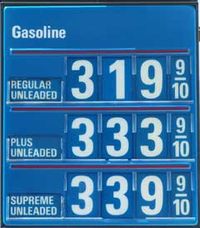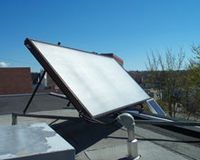Think of this as Volume 15, Number 1 of A-Clue.com, the online newsletter I've written since 1997. Enjoy.

With the stock market just starting to point toward better times ahead, the price of oil went past $90 per barrel, and the average price of a gallon of gas rose above $3 per gallon.
This is not supposed to happen at Christmas.
Prices rose not because of weather, and not because of costs, but simply because they could. The price of energy is set in two markets, New York and London, and no matter where the oil comes from it moves at that price. Some think we're looking at $5/gallon by 2012.
That price has nothing to do with costs.
A low cost supplier like Saudi Arabia makes an enormous profit at $90/barrel. Even $50/barrel production from deep under the Gulf of Mexico becomes profitable at today's prices. Despite all the talk there remain vast reserves of oil underground, which can be produced when the price is right.
The result is we've put our national security into the hands of Saudi Arabia. The whole point of the Iraq war was that their pools near Basra are similar to those the Sauds control, and once they're drilled they can be pulled up at a similar cost. Somehow the Bush people thought that controlling this pool would enhance our national security.
They were wrong.
How we cut the string is best understood by looking at the economics of oil and solar power.

In the case of solar, you get a steady stream of energy once you've bought the system. This continues, even after the system is fully paid-for, despite changing technology that may make a new system seem economic, regardless of electricity's price. Supply is inelastic, but the incremental cost of that supply is zero.
Those who doubt whether renewables can scale to meet demand need to consider this fact. Assuming solar cell production doubles each year actual capacity rises much faster. The first year's production might be 1 gigawatt, but if you produce 2 gigawatts of capacity the next year total production for that year is nearer to 3. The same doubling continues, so in the third year production is closer to 7 gigawatts, and in the fourth year it's around 15.

Yes, you have storage problems with solar power. The same inelasticity of supply hampers wind. Geothermal plants can be turned off, but when they are the energy fields below them aren't increasing in value. Biofuel plants are similar in that respect.
So oil supplies are elastic, renewable energy supplies inelastic. Oil has a low incremental cost once the capital outlay is done, solar a zero incremental cost, while geothermal and biomass have both capital and operational costs that scale downward with mass production . The capital costs of oil will continue going up, those of renewables will either remain level (wind and geothermal) or go down (solar).
Demand, meanwhile, is on a long-term downward slide (at least so far as electricity is concerned) thanks to more efficient devices and conservation industries.
Let me give you an example of the last from this past week. I like to make chicken stock. For years I roasted my bones in the oven and put them in a pot with water. The stock took three hours to make, and it took another six hours to reduce it. But for Christmas this year Santa got me a pressure cooker. Now that three hours is one hour, and on a low flame at that.
If Americans become as efficient as Europeans, as conscious of the money dribbling out of their pockets from their wasteful use of electricity and oil, we'll be using half as much as we do now in a half decade, without impacting our lifestyles one bit. Even if consumers aren't thinking this way — that saving energy is saving money — businesses are. The energy efficiency of American industry is actually quite good, and getting better each year.
A number of lines have to be crossed, and will be crossed, as renewable supplies increase over the next few years. We've already crossed the cost line of nuclear power. Next will come a time when the growth in demand is satisfied by renewables, leaving us with what appears to be a stable market. But then we'll cross the lines which mark the costs of burning oil, then coal, and finally natural gas. And once those lines are crossed, the incremental cost of in-place solar cells continues going down.
Once the trend is established — long before those last three lines are crossed — there will be a panic in the global oil patch. It won't be peak oil that destroys the industry, but excess oil that causes the market price to dive and the regimes based on oil — the Sauds, the Texans, the Russians, Venezuela — to fall.
That's what I'm looking forward to. I am living in confidence that the string can be cut in the next five years, that it will be cut, and that all those who have pulled my string for most of my life are going to fall. As more people see that day coming, political attitudes are going to change.
It's going to be fun to watch.











Wow! This is really informative. I must visit this site again. I liked every bit of it. Why not visit my website, http://nature-site.blogspot.com . Thanks!
Wow! This is really informative. I must visit this site again. I liked every bit of it. Why not visit my website, http://nature-site.blogspot.com . Thanks!
Yes! Definitely we can’t be prisoners of oil and just nod to every price they throw at us we really need to look for alternative now. This will continue to increase since some places in the middle east is actually running out of oil.
This news really signals the importance of solar energy home.
Yes! Definitely we can’t be prisoners of oil and just nod to every price they throw at us we really need to look for alternative now. This will continue to increase since some places in the middle east is actually running out of oil.
This news really signals the importance of solar energy home.